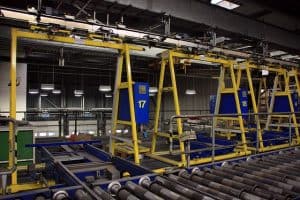
A recent survey finds growing frustration that AI isn’t being implemented fast enough across a range of industries.
Every industry has its own story to tell with artificial intelligence. For retailers, it means greater insights into customer service. For transportation companies, it means autonomous vehicles. For healthcare providers, it means more rapid and precise diagnostics.
A recent survey of 751 executives, released by KPMG, even finds growing frustration that AI isn’t be implemented fast enough across a range of industries. Majorities of executives in technology, retail, financial services, healthcare, and transportation companies are moving forward with AI and seem pleased with the results being delivered.
See also: How AI Will Make Industry 4.0 Profitable
The KPMG inexplicably left out the manufacturing sector, which is perhaps the largest consumer of AI technology. And it appears many manufacturers are retrenching or reconsidering the direction of their AI investments.
A survey of 250 manufacturing firms released by Plutoshift sheds some light on AI adoption within the manufacturing sector. The survey finds that they see value in implementing AI solutions, many are struggling to deliver clear results and are reevaluating their strategies. Close to two-thirds (61%) report they need to reevaluate the way they implement AI projects. At this point, only 17 percent could say they have completed an AI implementation to the point where it’s delivering expected results.
What’s behind this rethinking of AI projects? The main reason is a lack of data infrastructure needed to support AI. Eighty-four percent of respondents say their company cannot automatically and continuously act on their data intelligence. “When it comes to the data intelligence journey, companies can fall anywhere from not having installed data collection sensors, to being able to extract data that directly leads to actionable insights,” the report states. “Only a small portion of companies say they have data intelligence and can act on it automatically and continuously.”
A majority of manufacturers, 72 percent, also said it took more time than anticipated to implement the technical/data collection infrastructure needed to take advantage of the benefits of AI.
The technology infrastructure is not ready, and neither is the organization. At least 62 percent of manufacturing executives indicate it took more time than anticipated to acquire internal buy-in and commitment to implementing AI. Another 60 percent said their company struggled to come to a consensus on a focused, practical strategy for implementing AI.
Access to real-time, actionable data and insights is key to manufacturing AI efforts going forward. In addition, the report’s authors state, “It’s important that an AI system empowers each operator to take action. Manufacturing companies have the opportunity to utilize AI that empowers operators and teams with automated performance monitoring for any industrial workflow. In manufacturing specifically, AI can help businesses drive ROI by reducing resource consumption, as well as operating costs.





























